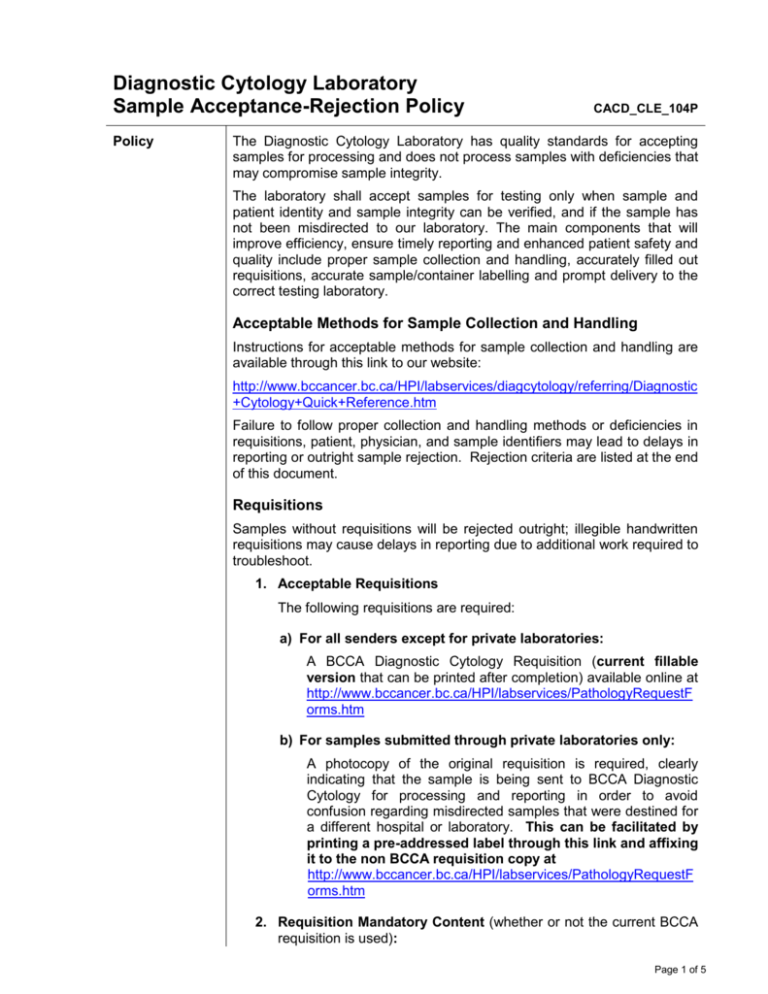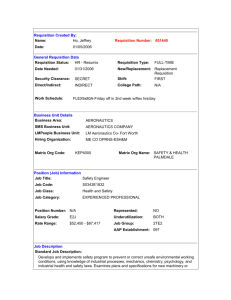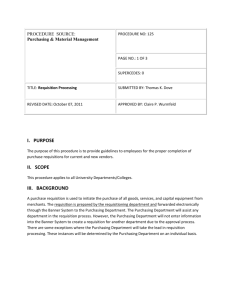PHSA Laboratories - BC Cancer Agency
advertisement

Diagnostic Cytology Laboratory Sample Acceptance-Rejection Policy Policy CACD_CLE_104P The Diagnostic Cytology Laboratory has quality standards for accepting samples for processing and does not process samples with deficiencies that may compromise sample integrity. The laboratory shall accept samples for testing only when sample and patient identity and sample integrity can be verified, and if the sample has not been misdirected to our laboratory. The main components that will improve efficiency, ensure timely reporting and enhanced patient safety and quality include proper sample collection and handling, accurately filled out requisitions, accurate sample/container labelling and prompt delivery to the correct testing laboratory. Acceptable Methods for Sample Collection and Handling Instructions for acceptable methods for sample collection and handling are available through this link to our website: http://www.bccancer.bc.ca/HPI/labservices/diagcytology/referring/Diagnostic +Cytology+Quick+Reference.htm Failure to follow proper collection and handling methods or deficiencies in requisitions, patient, physician, and sample identifiers may lead to delays in reporting or outright sample rejection. Rejection criteria are listed at the end of this document. Requisitions Samples without requisitions will be rejected outright; illegible handwritten requisitions may cause delays in reporting due to additional work required to troubleshoot. 1. Acceptable Requisitions The following requisitions are required: a) For all senders except for private laboratories: A BCCA Diagnostic Cytology Requisition (current fillable version that can be printed after completion) available online at http://www.bccancer.bc.ca/HPI/labservices/PathologyRequestF orms.htm b) For samples submitted through private laboratories only: A photocopy of the original requisition is required, clearly indicating that the sample is being sent to BCCA Diagnostic Cytology for processing and reporting in order to avoid confusion regarding misdirected samples that were destined for a different hospital or laboratory. This can be facilitated by printing a pre-addressed label through this link and affixing it to the non BCCA requisition copy at http://www.bccancer.bc.ca/HPI/labservices/PathologyRequestF orms.htm 2. Requisition Mandatory Content (whether or not the current BCCA requisition is used): Page 1 of 5 a) Patient identifiers: 3 identifiers plus gender are required i. Patient name (First, Last) ii. Date of birth (dd/mm/yyyy) iii. PHN (and BCCA chart number if a BCCA registered patient) iv. Gender b) Physician identifiers: i. Requesting Physician (First, Last) ii. MSC number iii. Complete Address where report is to be sent iv. Telephone number v. Fax number vi. Other physicians who need copies (the following information is required for each) 1. (First, Last) 2. MSC number 3. Complete Address where report is to be sent 4. Telephone number 5. Fax number c) Clinical information: i. Any previous diagnosis malignancy, diagnosis, date of ii. Treatment given if any iii. If the current sample is for assessing possible recurrence iv. Working diagnosis/questions being asked – i.e. why was this sample obtained? d) Sample information: i. Collection date (dd/mm/yyyy) and time (hh:mm) ii. Sample fixed? If yes indicate fixative; if unfixed, this must be stated iii. Laterality (Left or right) iv. Sample type: 1. Respiratory: Sputum; Bronchial wash; Bronchial brush; Bronchoalveolar lavage; Specify lobe (if applicable) 2. Urinary: Voided; Catheterised; Cystoscopy; Other (specify) 3. Body Fluids: Cerebrospinal; Pleural; Peritoneal; Pericardial; Joint (specify site) Page 2 of 5 4. Fine Needle Aspirate: Breast (specify site and R or L); Other (specify site; laterality) 5. Anal/rectal; Nipple discharge; Other (specify) Sample Containers, Slides or Cell Blocks 1. Sample Container Identifiers (label must be on the side of the container, not the lid); 3 identifiers required: i. Patient name (First, Last) ii. Date of birth (dd/mm/yyyy) iii. PHN 2. Slide Identifiers: (mark on frosted end); 2 identifiers required i. Patient name (First, Last) ii. Date of birth (dd/mm/yyyy) 3. Cell Block Identifiers (if sample was processed in the sending laboratory); Laboratory accession number corresponding to number provided on the requisition; Block/s should be inserted in a separate envelope with 3 patient identifiers plus accession number and hospital name neatly and legibly written or typed on the envelope: i. Patient name (First, Last) ii. Date of birth (dd/mm/yyyy) iii. PHN iv. Accession number v. Hospital name Rejection Criteria The laboratory makes every effort to process test requests that are received. However, there are circumstances when the samples are determined to be unsuitable for testing or further investigation must occur prior to testing the sample. In both these cases, the sample may be rejected if unresolved even after further investigation. Samples may require investigation or may be rejected prior to testing in the following circumstances: 1. Inadequate volumes of sample received for the assay/test requested; 2. Inappropriate sample type (e.g. Surgical pathology sample sent to diagnostic cytology laboratory); 3. Sample improperly preserved; 4. Sample too old for analysis (e.g. For unfixed samples delayed in transit) 5. Sample transport issues e.g. Leaking sample, improper adherence to packing requirements including specific temperature ranges, delays in transport and delivery; 6. Broken sample containers, or slides; 7. Improperly labelled sample or incomplete requisition e.g. Missing Page 3 of 5 mandatory identifiers listed above; label on the lid, not the side of the container; 8. Unlabelled samples and/or containers; 9. Mismatched information between sample/container label and requisition; 10. Sample and requisition identifiers match but belong to the wrong patient (this may only be discovered after a test has been run, with unusual or unexpected results questioned by sending physician); 11. Misdirected samples. Samples meant for another laboratory sent to our laboratory. Procedures for each type of deficiency are listed in the CACD_PRE_1001JA2 Diagnostic Cytology Sample Acceptance-Rejection Procedure.doc Purpose To define the conditions under which the laboratory will accept samples for testing. Audience Laboratory users and laboratory staff. Scope All types of samples received for testing. Definitions Incorrectly Labelled Sample (aka: Mislabelled Sample) the mandatory identifiers on the sample label do not match the corresponding information on the requisition; the label on the sample and requisition match but the sample is subsequently identified as belonging to another person. Unlabelled Sample A sample is termed “unlabelled” when there is no identifying information on the container or slide. Irreplaceable Sample Samples that are one-of-a-kind or samples that cannot be recollected without significant impact to the patient. For this laboratory this includes all cytology samples except sputum, nipple discharge, rectal smears, oral scraps and voided urine. All samples that are considered irreplaceable shall be investigated for criteria that can establish uniqueness and thus secure linkage to the correct patient. In rare circumstances, this may require DNA identity testing if the identity of the sample and patient cannot be verified by other means. Replaceable Sample Any sample that may be recollected from the patient without significant impact. These are usually rectal smears, oral scrapes, nipple discharges, urine or sputum samples. Misdirected Sample A sample that was destined for another laboratory outside of the BC Cancer Agency for testing. These will be directed back to the laboratory indicated on the requisition. Page 4 of 5 Recordkeeping and Documentation All communications regarding rejected or held samples must be documented via the laboratory information system and the information placed on the ensuing report. If the sample is considered replaceable and cannot be tested, a report will be issued documenting the reason for cancellation of testing. Supporting Documents Procedures for each type of deficiency are listed in the CACD_PRE_1001JA2 Diagnostic Cytology Sample Acceptance-Rejection Procedure.doc References: 1. CLSI document Vol. 29, Number 13, May 13, 2009. GP33-P. Accuracy in Patient and Sample Identification; Guideline. 2. Diagnostic Accreditation Program Anatomic Pathology Accreditation Standards 2010; Anatomic Pathology Update March 22, 2012. 3. College of American Pathologists Laboratory General GEN.40491 Specimen Labelling. Page 5 of 5



